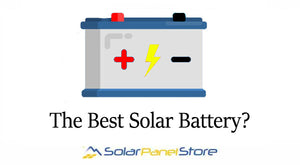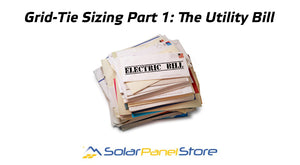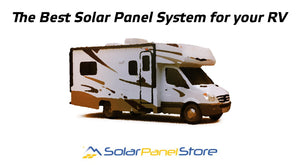Solar Panel Store Blog — Learning Solar

Which type of battery is best for solar applications?
There are several types of batteries that can be used for solar power systems, but the best type of battery will depend on your specific needs and circumstances. Some common options include lead-acid batteries, lithium-ion batteries, and nickel-metal hydride batteries. Each of these types of batteries has its own advantages and disadvantages, so it's important to consider factors such as cost, performance, and maintenance requirements when choosing the right battery for your solar power system.Lead-acid batteries are the most common type of battery used in solar power systems. They are relatively inexpensive and have a long life span, but they can be heavy and can lose their charge quickly if not used regularly. It's common to use sealed or wet style batteries for renewable energy applications.
The main difference between sealed lead-acid batteries and wet lead-acid batteries is the way in which the electrolyte solution is contained. In sealed lead-acid batteries, the electrolyte solution is absorbed into a sponge-like material, whereas in wet lead-acid batteries, the electrolyte solution is held in a separate compartment within the battery.
Sealed lead-acid batteries are also known as "maintenance-free" or "valve-regulated" batteries because they do not require regular maintenance or the addition of electrolyte solution. Wet lead-acid batteries, on the other hand, require regular checking and topping up of the electrolyte solution to ensure that the battery remains in good working order.
Sealed lead-acid batteries are generally more expensive than wet lead-acid batteries, but they are more convenient to use and require less maintenance.
Lithium-ion batteries are becoming increasingly popular for use in solar power systems because they are lightweight, have a high energy density, and can hold their charge for a long time. However, they are also more expensive than lead-acid batteries.
Nickel-metal hydride batteries are similar to lithium-ion batteries in that they are lightweight and have a high energy density. They are also relatively inexpensive, but they may not last as long as lithium-ion batteries.
The team here at SolarPanelStore.com has been working with batteries for off-grid and grid-hybrid systems for many years, and we have a lot of experience that we are happy to share with our customers. Please feel free to contact us for questions about batteries or to help with any kind of solar application!
Solar Home Grid-Tie System Sizing Part 1: Using a Utility Bill
Step 1: Find your monthly average electricity usage from your electric bill.This will be in kilowatt-hours (kWh). Due to air conditioning, heating and other seasonal usage, it is a good idea to look at several bills. You can add the typical summer, fall, winter and spring bills and divide by four to find the average monthly usage.
Step 2: Find your daily average electricity use. Divide the monthly average number of kWh use by 30 (days).
Step 3: Find your location's average peak sun hours per day. Find what is known as an insolation map, or average sun hour list. For example, Colorado is around 5 peak sun hours. Alternatively, a PV Watts is a great online tool from NREL that will provide great insight for month by month and average solar radiation for your specific location. (https://pvwatts.nrel.gov/)
Step 4: Calculate the system size to provide 100% of your electricity. Divide your daily average electricity use by average sun hours per day. For example, if the daily average electricity usage is 30 kWh, and the site is in Colorado, system size would be: 30 kWh / 5 h = 6 kWh. It's a good idea to multiply this number by 1.15 in order to account for factors such as inverter efficiency, dirt or pollutants that may accumulate on panels, etc., if you want to cover all of your use. (One of our solar home packages in the 7 kW range would be great for this!)
Take a look at some of our system options for grid-tie packages here, or contact our sales team for more information, we are eager to help out and provide you with everything you need to go solar!
- Loren Geist
- Tags: grid tie solar Learning Solar Solar Basics Solar Panels solar size

Deciding on the Best Solar Panel System for your RV
RV Solar Panels

Shopping for RV solar systems can be a drag if you don't have the right knowledge on what you will need for your situation. Solar panel mounting tends to be difficult if you've never done it before but we're here to help you along every step of the way.
Steps to deciding on the right solar system for Rv's
1) Decide what kind or RVer you are
First off, you will need to categorize your RV usage - that is, are you a full-timer? Or are you someone who just gets away for the weekends? If you fall in either of these categories, you'll want to really do the math before investing in a solar panel system. But if you're someone who tends to go away off the grid for extended periods of times but you're not a full-timer, then you should consider one of our solar electric systems. Why is this the most likely scenario where your investment will really pay off? Because the weekend warrior will always have enough battery to get through the weekend. And full-timers will most always find somewhere to doc where power is supplied at the RV park, and you're going to end up paying for that electricity anyway with your park fees. Same goes for marine solar, you need to ask yourself whether you'll have shore power or if you'll be spending extended periods on the water without a generator.
2) Decide how much solar power you will need
Electricity consumption differs from user to user. For example, if you have a larger RV with a microwave, TV, lighting, water pumps and electrical hookups for other devices, you'll need a different RV solar kit than someone who has a smaller RV that needs to run less lighting and perhaps only a water pump. So figure out how much power you'll consume in (example, 4 hours of TV might take 600 watts/hours per day, lighting = 350, refrigerator = 5,000). Then you'll need to know how much storage or battery capacity you'll need on board. From there, you'll be able to back into the numbers and get the proper setup.
An example might be needing to generate 2,000 watts per day so a nice 400 watt system would be the perfect system for someone who needed to power enough to use for that day on into the evening. Of course if you travel when you know you won't have full days of sun and some cloudy days, you'll probably want to increase the capacity for charging. It won't be too long that you'll break even after looking at a gasoline powered generator running to generate that kind of power, not to mention the impact on the environment.
3) Decide on the RV solar system or Marine system you'll need
Based on the few tips above, we'd love to help you decide on exactly what you need. Just give us a call and we'll gather your requirements and help you find the perfect, tailored solution to your portable solar panel needs.
- Dan Baldwin
- Tags: Learning Solar Solar Basics Solar Panels



